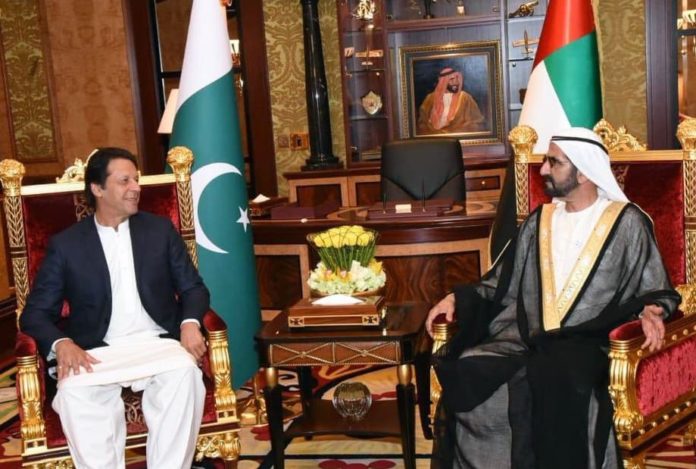United Arab Emirates (UAE) and Pakistan value their friendship and fraternal ties based on brotherhood, mutual respect and deep-rooted cultural affinities and identity of interests have continued to move from strength to strength since inception. UAE and Pakistan are bound by common threads to their religious and cultural values and their strong historical relations are based on a solid foundation laid down by late Sheikh Zayed bin Sultan Al Nahyan.
Momentous Bilateral Relations
Bilateral relations between two countries have further enhanced with the recent official visit of Prime Minister of Pakistan, Imran Khan. During his day long visit to brotherly country UAE, he met with various high officials and talked on diverse issues of mutual interest. Prime Minister Imran Khan and Crown Prince Shiekh Muhammad bin Zayed Al Nahyan have agreed to transform UAE- Pakistan relations into a long-term strategic economic partnership.
The Prime Minister was accompanied by a high-level delegation comprising Foreign Minister Makhdoom Shah Mahmood Qureshi, Finance Minister Asad Umar, and Minister for Petroleum Ghulam Sarwar Khan, Minister for Power Omar Ayub Khan, Advisor on Commerce Abdul Razak Dawood and Chief of Army Staff General Qamar Javed Bajwa. He was received by his highness Sheikh Muhammad bin Zayed al Nahyan and accorded a ceremonial reception at the Presidential Palace. In Dubai, the Prime Minister was received by His Highness Sheikh Muhammad bin Rashid Al Maktoum, the Vice President and Prime Minister of the UAE and Ruler of Dubai.
Prime Minister Khan also visited Sheikh Zayed Mosque and the Martyrs’ Memorial where he paid homage to Emirati heroes who had sacrificed in the service of their nation.
Delegation Level Talks
The delegation level talks with Crown Prince His Highness Sheikh Muhmmad bin Zayed focused on all areas of bilateral, regional, and global interest. Both leaders expressed satisfaction at the positive trajectory of relations and agreed to take immediate measures to further elevate their historic partnership. They resolved to strengthen trade and economic ties and eliminate all impediments to seamless flow of trade and investment between the two countries.
Fruitful outcome of the visit
They expressed satisfaction over the fruitful outcome of the visit of the high-level UAE economic delegation to Pakistan recently and reiterated their resolve to transform the existing special relations into a Strategic Long-Term Economic Partnership by adopting a direct, transparent and time bound approach.
Formation of comprehensive Roadmap
The two sides agreed to chalk out a comprehensive roadmap to accelerate cooperation and partnership in areas encompassing trade, investment, economic development, energy, infrastructure and agriculture, with a view to accrue early dividends from the economic partnership.
Pakistan UAE Joint Ministerial Commission 2019
Prime Minister Khan and Crown Prince Muhammad bin Zayed decided to hold the next Pakistan-UAE Joint Ministerial Commission, to be co-chaired by the respective Foreign Ministers in Abu Dhabi in February 2019.
Bilateral political Consultations
They further reaffirmed their commitment to hold the Senior Officials’ Bilateral Political Consultations between the Foreign Ministries and fast track finalization of pending agreements at the earliest.
Satisfaction on-going Defence & Security Cooperation
The two leaders expressed satisfaction at the on-going defence and security cooperation, and resolved to explore further collaboration in the areas of training, joint exercises and defence production.
Golden principle of Engagements
The two leaders noted that a key element of partnership between the two countries was the complete identity of views on regional and global importance. They reiterated their strong belief that only by espousing the principles of tolerance, inclusivity, non-interference and focusing on a people centric development agenda can the region attain sustainable peace and stability.
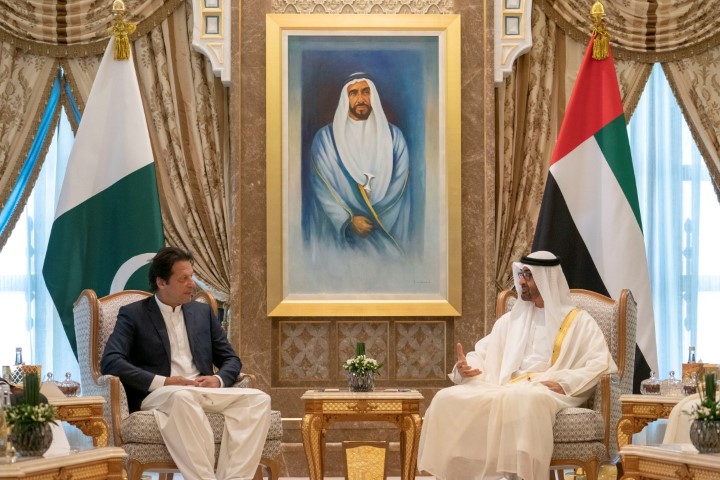
Condemnation of Terrorism
They strongly condemned terrorism in all its forms and manifestations, and expressed their resolve to work closely to root out this scourge. The Crown Prince recognized the efforts and unparalleled sacrifices made by Pakistan to eliminate terrorism and extremism.
Cooperation against Transnational organized crime
The two sides also agreed to further strengthen their cooperation to deal with transnational organized crime, including drug trafficking, money laundering and human trafficking.
Prime minister Imran khan’s high tribute
Prime Minister Imran Khan paid rich tribute to the founder and first President of the UAE, His Highness Sheikh Zayed bin Sultan Al Nahyan for his foresight and visionary leadership and his contribution towards laying the foundation of Pakistan-UAE friendship. Sheikh Zayed, the Prime Minister recalled, was a sincere friend of Pakistan, who had great love in his heart for Pakistan and its people. The people of Pakistan reciprocated this love, and continue to hold Sheikh Zayed and the leadership of the UAE in high esteem.
Appreciation of UAE miraculous Development
The Prime Minister further lauded the progress achieved by the UAE in fostering tolerance, inclusive economic development, innovation, and youth and women empowerment. In particular, he appreciated UAE’s success in promoting tourism, and leveraging technology for improved governance.
UAE’s continued support
Prime Minister Imran Khan thanked the UAE and its leadership for their continued commitment to Pakistan’s socioeconomic development in the shape of Pakistan Assistance Programme. He specifically thanked His Highness Sheikh Muhammad bin Zayed Al Nahyan for his support to eradicate polio from Pakistan.
Pakistan’s Economic Agenda
Prime Minister Imran Khan briefed the UAE leadership about his government’s people centric reform agenda including the steps being taken to eliminate corruption and promote transparency and accountability at all levels of government.
Pakistan & Expo 2020
Pakistan reiterated its readiness to actively participate in Expo 2020 and extend full support to the UAE in making this mega event a great success. Pakistan offered UAE the services of its IT professionals and skilled labour, in preparing for Expo 2020.
Acknowledging the contribution of Pakistani professionals as well as skilled and unskilled workers in the development of UAE, the two sides agreed to enhance cooperation on all labour related issues.
Prime Minister 2nd Visit to UAE
This was the second visit of Prime Minister Imran Khan to the UAE in as many months. The visit underscored the strength and substance of the Pakistan-UAE special relationship, which is based on the spirit of mutual affection and deep trust, and rooted in age old civilizational, religious, cultural and commercial affinities.
Prime Minister Imran Khan expressed his sincere appreciation for the warm welcome and hospitality extended to him and his delegation. He reiterated his invitation to H.H Sheikh Mohammed Bin Zayed Al Nahyan, to visit Pakistan on mutually convenient dates. His Highness happily accepted the invitation.
UAE-Pakistan JVS
Foreign Minister Shah Mahmood Qureshi
Foreign Minister Shah Mahmood Qureshi said Pakistan has asked the United Arab Emirates (UAE) for a deferred payment facility for the import of oil. Pakistan’s side requested to get increased agricultural exports especially rice and fruits citrus and mangoes. Setting up a state-of-the-art LNG terminal in Pakistan with UAE’s cooperation was also discussed during the meeting. The Emirati delegation expressed interest in setting up an LNG terminal in Pakistan. A member of Emirati real estate company Emaar took keen interest to invest in different diverse sectors of Pakistan. UAE holds expertise in water desalination and if they could invest in setting up a plant in Karachi or Gwadar, Pakistan’s water crisis will be resolved and it will be a massive development.
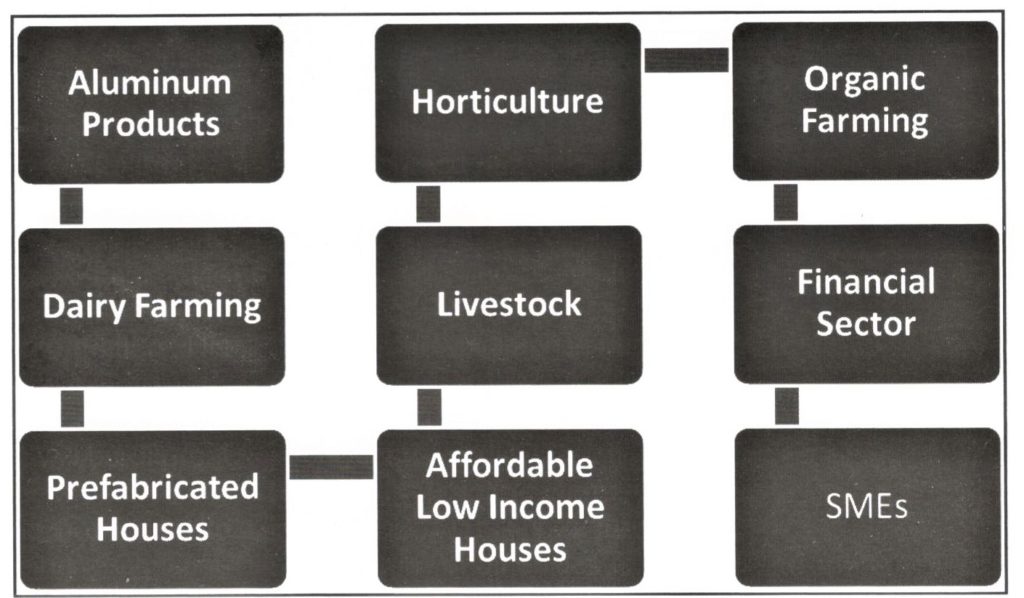
Business community
The Business community in the country has hoped that Prime Minister Imran Khan’s tour to United Arab Emirates (UAE) would not only help Pakistan boost its exports but would also explore new avenues of bilateral trade. It is hoped that if steps are taken in the right direction, the current trade volume of $8 billion between Pakistan and UAE would be surpassed in coming years. It is important to build on the historic relationship between the two countries by encouraging investors on both sides to make use of the business opportunities.
Strong & Strategic Alliance
Both countries have strong and strategic alliance. More than 1.6 million Pakistani community (the biggest Pakistani community in the world) lives and works in the UAE. Their remittances from working in the UAE amount to $433.42 million (Dh1.59 billion) annually. Moreover, Pakistan’s private sector has invested in Dubai’s real estate sector. According to Pakistan official figure UAE investments in Pakistan stand at more than $3.9 billion. Pakistan exports $869 million worth of goods to the UAE, and imports goods worth $7.5 billion in return. Pakistan’s exports to UAE include mainly rice, textiles and leather, which do not signify the true potential of opportunities between the two countries.
New Dimensions of Future cooperation
Now, it seems that the bilateral relations between the United Arab Emirates and Pakistan have acquired new dimensions at all political, economic and social levels emerging into trust-worthy strategic partnership. UAE has been one of the biggest investors in Pakistan for the last so many years which surely encouraged investment and helped greater trade and commerce activities.
Pakistan Offers Vast opportunities
Pakistan offers vast opportunities for foreign direct investments and joint ventures in infrastructure development, electricity generation, water desalination, agricultural based industries, insurance and real estate. Pakistan enjoys cordial relations with United Arab Emirates. Both countries have cooperated with each other in their need of hour. UAE has made huge investments in Pakistan in different fields, and in reciprocate, Pakistan also cooperated with UAE in various fields. Pakistan trained pilots of UAE and in other sectors as well.
Dubai: A Regional Trade Center
Dubai is a regional trade center and has become financial hub of the region. It was the first country in the region which opened its real sector for other countries. Prime Minister Imran’s visit to UAE is of great he importance wants as enhanced trade relations with UAE.
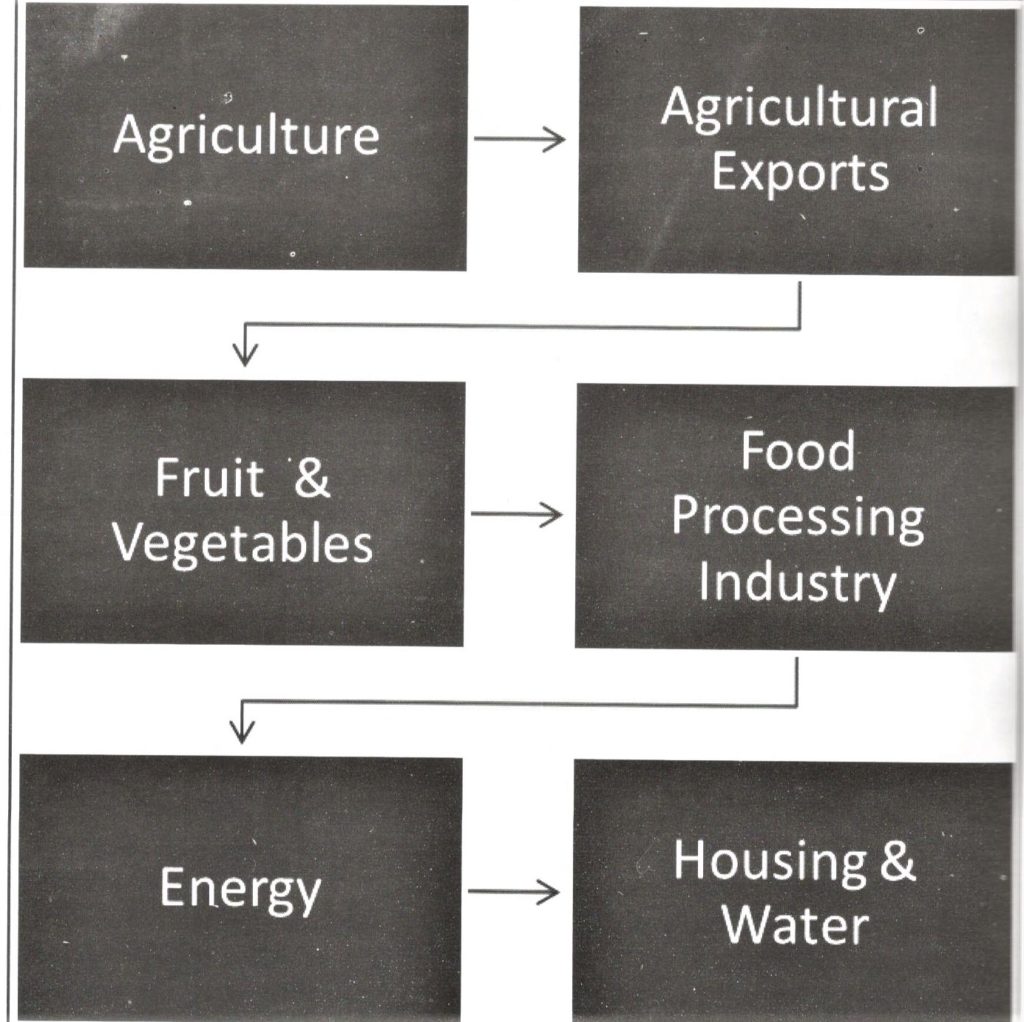
UAE’s Generous Humanitarian Assistance
Right from the beginning, the UAE has been known the world over for its generous humanitarian assistance, stability, tolerance, innovation, vision for better health and education. Now, it has become hub of investments, re-exports, technologies, tourism, and the last not the least, renewable energies. In Pakistan, it encourages investment and calls for greater trade and commerce activities. IJAE is one of the largest investors in the country but bilateral trade has been steadily growing over the years and people-to-people contacts are constantly on the increase.
The founder of UAE Sheikh Za ed bin Sultan Al Nahyan
The founder of UAE Sheikh Zayed bin Sultan Al Nahyan was keen to give an impetus to the bilateral relations between the two countries from the very beginning. It was further strengthened and patronized by H. H. Sheikh Khalifa Bin Zayed Al Nahyan, the President of the UAE and H. H. Sheikh Mohammed bin Rashid al Maktoum, Vice-President, Prime Minister and Ruler of Dubai.
UAE Socio-Economic Development 2018
| Economic Indicators | 2014 | 2015 | 2016 | 2017 | 2018e |
| GDP (billion USD) | 401.96 | 370.30 | 371.35 | 407.21 | 435.70 |
| GDP (constant price% | 3.1 | 3.8 | 2.7 | 1.5 | 4.4 |
| GDP per capital (USD) | 42,213 | 38,650 | 37,698 | 40,162 | 41,772 |
| Inflation Rates % | 2.3 | 4.1 | 1.8 | 2.8 | 3.7 |
| Current Account (billion USD) | 40.33 | 12.31 | 8.78 | 14.37 | 16.97 |
| Current Account % of GDF | 10.00 | 3.3 | 2.7 | 3.5 | 3.9 |
Outcome of Recent Visits (2018)
During the recent visits both countries reaffirmed their strong commitment to further reinforce the bonds of friendship. They urged upon the need to expand the horizon of their bilateral cooperation in diverse fields reflecting deep-rooted and historic ties. The premier’s latest visit to the UAE comes on the heels of increased bilateral contacts aimed at forging closer economic, trade and investment relations between the countries in areas of common interest.
Prime Minister Khan had first visited the Emirates in September 2018 following his election, a trip during which he met the Abu Dhabi crown prince. The trip was followed by a visit to Pakistan by a IJAE delegation comprising CEOs/ senior officials of major companies including Mubadala Petroleum, ADIA (Sovereign Wealth Funds), Etisalat, DP World, Dubai Investment Authority, Emaar Properties, Aldahra Agriculture and Abu Dhabi Fund for Development.
Areas of Cooperation
UAE is the leading economy in the GCC and MENA and second largest after Saudi Arabia. Its economy is strong, stable and sustainable. It is resilient because of its rigorous diversification of channels of production and industrialization. It is one of most competitive and smarter economies in the region as well as in the world.
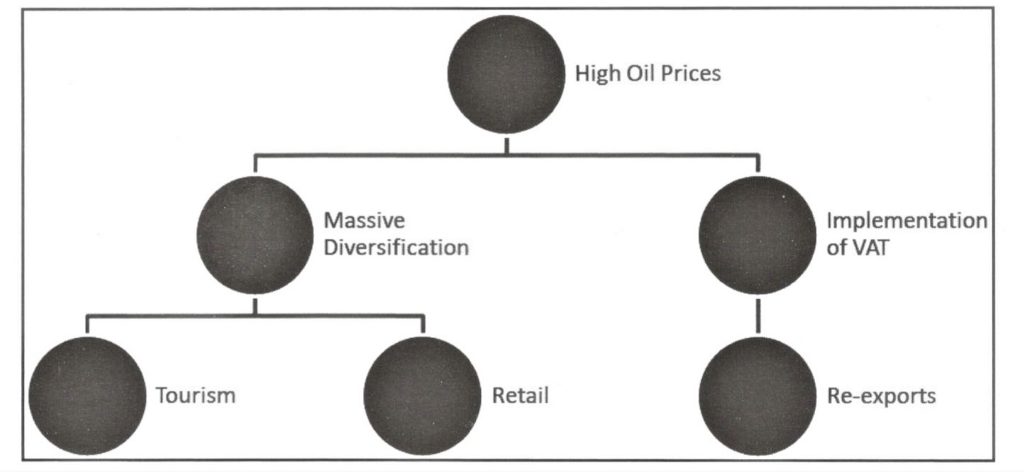
UAE’s Main Elements for Robust Economic Growth (2017-18)
The country’s Gross Domestic Product (GDP) is expected to cross 400 billion dollars in 2018 with a GDP around 4 percent rising from the moderate growth of 1.4 percent in 2017.
Being prominent region expert on UAE & GCC I am hopeful that UAE’s economy will continue to gain momentum in 2018, driven by an expanding non-oil sector, policy recalibration, and massive infra- structure investments.
IMF Estimations (November 2018)
As per IMF estimates, UAE is expected to double its GDP growth rate in 2018 to around 3.4 percent. Abu Dhabi’s economy that is expected to grow by 3.2 percent in 2018, substantially up from a flat growth of 0.3 percent in 2017. Meanwhile, growth in Dubai will edge up by 0.2 percent to 3.5 percent in 2018. The non-oil sector in both, Dubai and Abu Dhabi is expected to accelerate by 3 percent.
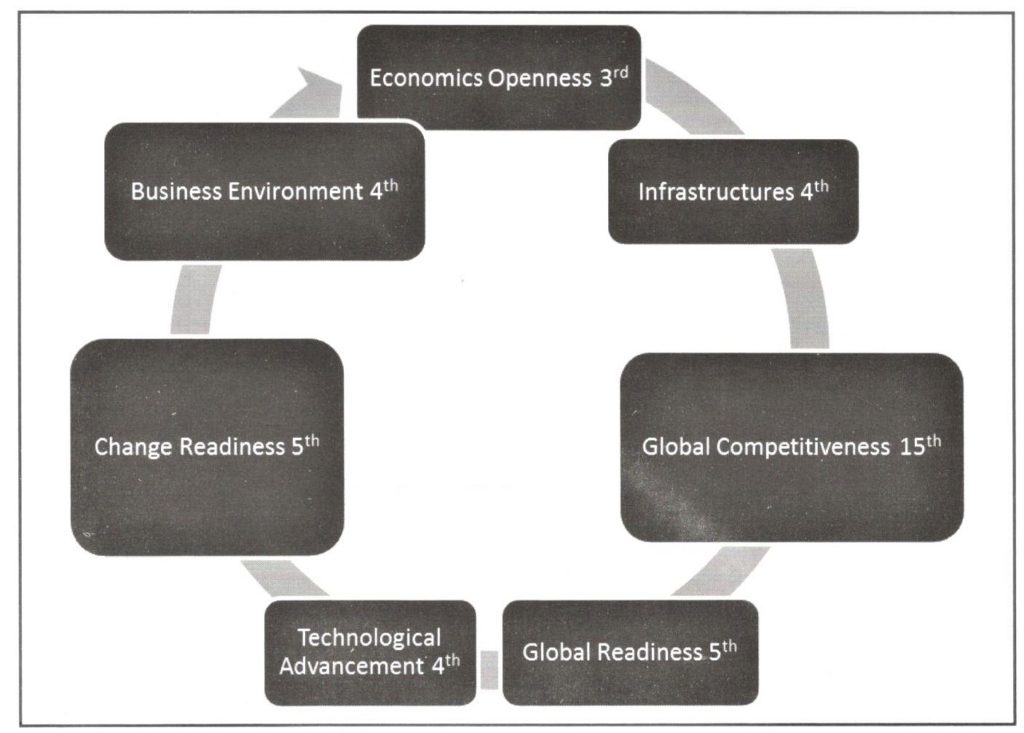
Global Rankings
UAE has been rated the most competitive economy in the world and first in the GCC and MENA. It has introduced constant economic reforms due to which it is now receiving its diversified dividends. Its private sector is vibrant. Its service sector is booming. Its tourism sector is the money minting machine to its national economy Its civil aviation sector is progressing and has become connecting hub in the region. Its industrialization national drive has been a grand success story which has widened its diversification. It has become ideal center of re-exports and innovations.
It has been receiving highest ratios of Foreign Direct Investments (FDIs) in the region for the last so many years. Its banking system is resilient from any financial shocks of cyber-attack.
Government Policies
UAE has institutionalized various meaningful short and long terms economic policies owning to which it has surpassed all the regional economies. Its visionary leadership has continually ushered the economy towards increased diversification into non-oil sectors, sustainable growth, and human capital development. Consolidation in state run entities will continue to gain momentum alongside investment into state-of-the-art infrastructure. The later will be aligned with UAE’s ambition of becoming a world class player in global tourism, retail, and supply chain industry- dimensions, where it already holds a strong international positioning.
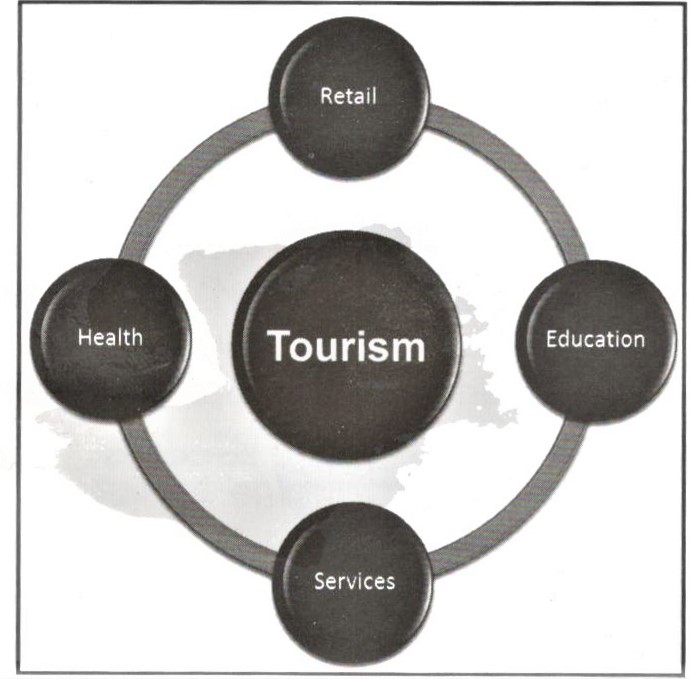
UAE’s Sectorial Growth
UAE is one of the most diversified and developed economy in the region. It will continue to hold prominent placement amongst international investors. UAE’s incredible positioning amongst global investors also results from its political stability, higher transparency, crime free rates and a very cosmopolitan society, where nationals from over 200 countries happily reside.
It is hoped that sectors such as education, healthcare, retailing to UAE’s overall GDP UAE government is giving tremendous weightage to knowledge economy, human capital development, skill enhancement, and nurturing an innovation centric society. It has earmarked 20.5 percent of the federal budget for education.
| UAE’s Macroeconomic Indicators (Real GDP Growth Trends & Estimations %) | |||||||||
| 2011 | 2012 | 2013 | 2014 | 2015 | 2016 | 2017 | 2018 | 2019 | 2020 |
Tourism (2018 & Beyond)
It is estimated that tourism will one of the leading contributors of its economy. With a tourist arrival of 16 million in 2016, Dubai holds 6th position in the list of the world’s top 10 most visited destinations. Other cities such as Abu Dhabi and Sharjah are also extending investment into tourism and hospitality. Potential growth opportunities can also be identified in UAE’s burgeoning manufacturing sector, where the PMI index averaged around 55 indicating robust optimism and potential returns for investors.
UAE: Out reformed regional economies 2018
UAE economy during 2018 has outperformed all the regional countries. It is mainly driven by the projected growth of the non-oil GDP in excess of 3.3 percent compared to 3.1 percent estimated in 2017. Also, the partial recovery of the oil GDP will have a consequent impact on the overall economic growth of the country. UAE government has invested heavily into diversification and infrastructure development projects. The de-regulation of the oil prices is expected to make an even bigger contribution to the diversification of the economy enabling the government to drive additional investments into the non-oil sectors.
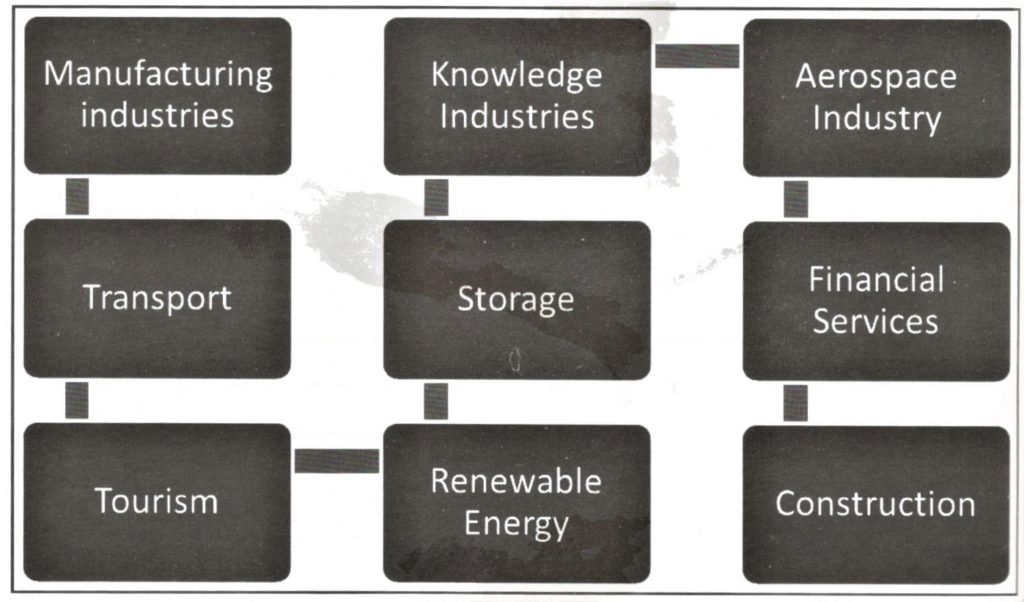
UAE’s Diversification Policy
UAE is the champion of diversification in the region and one of the leading economies in the world. It has successfully transformed its scrappers. Its national journey from oil-based economy to non-oil market is a successful transition which has now widened its basic core and economic outlook.
Phenomenal growth in manufacturing industries, knowledge industries, aerospace industry, transport, storage, financial services, tourism, new and renewable energy and construction during 2018 has accelerated economic growth of the UAE. These sectors played a role in providing the right conditions to attract foreign direct investment and promote innovation. This development has been a catalyst for the establishment of industrial and free zones and the formation of partnerships with multinational companies.
UAE’s Economic Forecast (2018-2020)
| Economic Indicators | Actual | Q1/2018 | Q2/2018 | Q3/2018 | Q4/2018 | 2020 |
| Unemployment Rates | 3.69% | 4.8% | 4.8% | 3.6% | 4.8% | 4.9% |
| Inflation Rates | 1.70% | 2.3% | 3.1% | 3.3% | 3.3% | 3.4% |
| Interest Rate | 2% | 2.25% | 2.25% | 2.25% | 2.25% | 3% |
| Balance of Trade (AED Million) | 250,9000 | 350,000 | 350,000 | 250,978 | 350,000 | 350,000 |
| Actual | Q1/2018 | Q1/2018 | Q1/2018 | Q1/2018 | 2020 | ||
| GDP | 3.0 % | 3.1% | 3.9 % | 3.9 % | 3.9 % | 4.3 % | |
| GDP AED Million | 348.78 | 390 | 390 | 342 | 390 | 425 | |
| GDP (Current Prices) AED Million | 1391127.36 | 1223405 | 1223405 | 1431795 | 1223405 | 1325596 | |
| Gross Fixed Capital Formation AED Million | 296,297.26 | 375,000 | 375,000 | 375,000 | 375,000 | 430 ,000 | |
| GDP per Capita | 40864.20 | 41100 | 41100 | 42015 | 41100 | 43100 | |
| GDP per Capita PPP USO$ | 671,133.10 | 74800 | 74800 | 68941 | 74800 | 80300 | |
World Economic Forum and the World Bank Group (2018)
According to the world Economic forum and the World bank group (2018) the UAE leads the Arab world in competitiveness as increased diversification makes its economy more resilient. The UAE, ranked 17th globally in competitiveness, has been able to successfully maintain a stable macroeconomic environment due to its diversification. Moreover, the IMF predicts GDP growth to pick up again this year to 3.4 percent, driven also by the good performance of the non-oil economy. Over the past decade, the UAE has experienced significant improvement across all dimensions of competitiveness and closed the gap with the OECD average in all of them except for higher education and training and to a small extent health and primary education. In relative terms with respect to the country’s performance across all pillars], innovation, financial market development, and market size are weighing on the UAE’s competitiveness, while the country benefits from strong institutions, good infra structure and a good level of health and primary education. The UAE has increased equity investment in technology firms from $100 million to $1.7 billion in just two years.
Abu Dhabi Economic Vision 2030
The Abu Dhabi Economic Vision 2030 provides for a shift from dependency on hydrocarbon exports towards an advanced knowledge-based economy. Multiple diversification initiatives are already well-advanced, with Abu Dhabi’s tourism, manufacturing, energy, transportation, logistics and media sectors achieving a remarkable trans formation over the past few years. The emirate’s economy is forecast to grow by 3.9 percent in 2018. Inspired by a vision to build a sustainable and diversified, high value-added economy well integrated into the global marketplace, Abu Dhabi has developed an open, efficient and effective investment regime validating its position as a regional hub. In Abu Dhabi, for example, the Government has been following a vibrant roadmap, targeting non-oil segments to capture more than 60 per cent of the overall economy by 2030.
FDIs
It maintains its historical position as the leading recipient of foreign direct investment (FDI), which flows into Abu Dhabi, accounting for 27 percent of overall FOI stock. Given Abu Dhabi’s leading reputation as one of the GCC’s real estate hotspots, backed by the government’s on going well-diversified range of projects, the way ahead looks optimistic, capitalising on the maturing nature of UAE’s property market in general.
Abu Dhabi Promotes more Competitive Investment Climate
Being expert on UAE and GCC I am strongly confident that Abu Dhabi’s on-going efforts are increasingly capable of promoting a more competitive investment climate, to attract both local and foreign investors, offering an optimum environment for businesses to flourish.
Recent announcements by the UAE Government have included thousands of new jobs, the relaxation of some immigration rules and a Human Development Report that plans to increase the number of working women in the nation.
UAE’s Friendly Business Environment (2017-18)
UAE has also introduced a plan to create a friendly business environment, facilitate access to finance and provide a solid basis for the implementation of public-private sector partnership projects. It is hoped that such initiatives and projects will have a significant impact on the stature and reputation of the UAE as an ideal destination for conducting bus ness as it moves on from sim diversification from oil and gas and attempts to build a sustainable, knowledge-based economy.
| Engines of Growth | Details | |
| Energy Sector | Plans for the development of unconventional gas resources have been approved as Abu Dhabi National Oil Company (ADNOC) seeks to enable future value-c reaction and make international investments that will position it as a global player the down-stream market. | |
| Property | Abu Dhabi has laid the found at ion for a regularised, progressive sector capable o’ expanding, attracting investments and adapting with market changing conditions. | |
| Real Estate Sector | It accounted for almost 8 per cent of Abu Dhabi non-oil GDP at constant prices during the period Jan-Sept 2017, compared with 7.6 per cent in 2016. While Dubai recorded Dh58 billion ($15.8 billion) in property sale transactions in the first quarter of this year and real estate accounted for 7.1 per cent of its GDP in 20 17. | |
| Tourism | Abu Dhabi is investing to achieve its visitor targets, with ambitious plans for Saadiyat Island and Yas Island. Elsewhere in the UAE, new attractions include the manmade island of Bluewater’s just off Jumeirah Beach and Azizi Riviera, a mega project on the banks of the Dubai Canal, due for launch in 2019. | |
| Financial Services | In financial services, opportunities are being developed in new and emerging areas, capitalising on growing demand for sophisticated sustainable and green financial products. |
Stimulus Plan (2018)
Abu Dhabi has announced the new Dh50 billion stimulus plan which will help lift gross domestics product growth, increase consumption and revitalise the property market as the Government takes advantage of high oil prices to finance economic expansion.
The three-year package and 10 initiatives aim to stimulate growth the emirate and create at least 10,000 jobs for Emiratis in the public and private sectors. Abu Dhabi’s Executive Council has been given a deadline of early September to draw up a detailed execution plan with initiatives that will cover infrastructure and legislative projects, small and medium-sized enterprises and industrial and social projects. The announcement seems to be positive, further highlighting an increased focus on supporting growth and strengthening the business environment.
The stimulus is quite substantial as well, corresponding to up to 6 percent of Abu Dhabi’s GDP addressing several key policy areas like facilitating doing business, stimulating SMEs, encouraging public private partnerships and developing infrastructure. The latest announcements also support non-oil sector growth in the UAE.
The 10 initiatives from Sheikh Mohammed bin Zayed, Crown Prince of Abu Dhabi and Deputy Supreme Commander of the Armed Forces, will put the emirate front and Centre with investors in the UAE, the region and the world, who are looking for the ideal environment in which to operate and make returns.
Allowing more freedom of movement between onshore areas and offshore free zones will be an important part of a more attractive landscape. Arguably, removing the requirement of a physical office space for business license registration will be more so, in particular for start-ups, small and medium enterprises and free lancers, creating a wider pool of skilled workers, service providers and support infrastructure for the bigger companies.
Amid the lower spending by the public sector, as government jobs were reduced and the reforms kicked into gear, businesses relocated from Abu Dhabi to other parts of the UAE or even abroad.
The UAE as a nation has remained steadfast and consistently buoyant in creating new opportunities for growth, while quickly addressing challenges and immediately finding solutions. As part of a globalized economy, it undoubtedly felt the impact of economic challenges of major economies in the world. However, it has proactively exerted efforts to be at the forefront by developing key mechanisms that ensure its economy remains stable in uncertain times.
Strengthening the UAE Economy less than half a century ago, the UAE was not known to the global economic community. For decades, the country relied mostly on pearl trading and maritime commerce, scant agricultural and livestock activities, and traditional manufacturing to sustain its subsistence economy.
The UAE is now the most diversified economy in the Gulf Cooperation Council region. The non-oil sector currently accounts for around 70 percent of the national GDP, with the figure expected to swell to 80 percent by 2021.
UAE Vision 2021 Development Strategy
Each of the seven Emirates has different economic conditions and priorities, although they all adhere to an overarching UAE Vision 2021 development strategy. While Abu Dhabi holds most of the country’s oil and gas reserves and controls most national savings, Dubai acts as the commercial hub of the country. Domestic economic growth will continue to be driven largely by these two emirates, with Dubai attracting huge foreign investments as it pre pares to host the historic 2020 World Expo and Abu Dhabi injecting more funds into infrastructural works. The economies of the two emirates exceed those of other GCC neighbors.
The UAE’s rankings on various global economic indices reflect the success of nationwide efforts to accelerate diversification, create an unparalleled business and investment environment, and nurture a knowledge-driven economy.
| Exports-Imports Parity | Actual | Q1/2018 | Q2/2018 | 03/2018 | 04/2018 | 2020 |
| Trade (AED Million) | 250,900 | 350,000 | 350,000 | 250,978 | 350,000 | 580,000 |
| Exports (AED Million) | 1,096,700 | 1,390,000 | 1,390,000 | 1,054,406 | 1,390,000 | 1,680,000 |
| Imports (AED Million) | 845,800 | 1,040,000 | 1,040,000 | 830,870 | 1,040,000 | 11,000,000 |
| Current Account (AED Million) | 424,400 | 87,900 | 87,900 | 25,606 | 8,7900 | 138,900 |
| Current Account to GDP % | 3.1 | 3.1 | 3.1 | 6.21 | 5.0 | 608 |
| FDI (AED Million) | 33,000 | 38,748 | 38,748 | 38,748 | 28,725 | 50,000 |
UAE’s Latest Policies
Most of the latest policies are based on reforms and improvements for facilitating the transition to a post-oil era. The Ministry of Economy is presently working on various laws related to foreign investments, industry regulation, protection of industrial property and industrial design, commercial trans actions, and arbitration to further boost economic productivity and expand the contributions of the nonoil sector. Key fiscal and economic policies enacted since 2015-17 have improved the country’s resilience to global economic pressures as well as its ability to remain financially and monetarily stable and sustain growth. It includes fiscal consolidation efforts that have increased electricity and water tariffs and removed fuel subsidies, among others. More policy introductions and structural reforms are forthcoming to further enhance the business environment, increase credit access, and modernize the labor market.
The UAE successfully maintained growth from 2010 to 2016. Its aver age real GDP growth of 4.6 from 2011 to 2016 surpassed the global average thanks mainly to non-oil activities. The IMF affirms that the UAE economy has been able to emerge relatively unscathed from the post-2014 oil shock. The country’s financial cushions, sound banking fundamentals, global safe-haven reputation, business-friendly environment and diversified sources of income are put its macro-economy on right track of further advancement.
Concluding Remarks
United Arab Emirates (UAE) and Pakistan are strategic partners. Due to rapidly changing socio-economic scenarios and geopolitical trends in terms of global trade wars, economic protectionism, disintegration of economic blocs, Yemen, Syria, Afghanistan, CPEC and BRI it is the need of the hour that both brotherly countries must re-establish functional strategic partnership for the further strengthening of socio-economic integration, greater food and energy security, better political understanding and above all energy cooperation in the days to come.
Economics of UAE-Pakistan bilateral relations is based on a strategic partnership owing to which both countries have been assisting each other in different sectors of survival and production in the past.
UAE has been one of the main investors in the country in its different sectors i.e. infrastructure, real estate industry, banking, telecommunications, insurance, aviation and the last but not the least energy. According to official figures, UAE has more than GDP of $ 450 billion, 30 percent of which is generated from export of oil and petroleum products, while 70 per cent of the revenue is being earned from tourism, transport, plastic industry, renewable sources of energy and financial services etc. Its macro-economy prospects of 2018 and beyond are very strong and bright. A number of UAE companies are currently operating in the country, including Emirates National Oil Company, International Petroleum Investment Company, Etisalat, Dana Gas, Al Ghurair, Emaar, DP World, Abraaj Capital, Thani, Danata, Atharihra Agricultural Company, Julfar, Emirates Investment Group, and Arab Company for Packaging and Al Nasser Holdings.
UAE’s free economic zones are proving ample opportunities for FDIs and joint ventures for the public-private partnership due to which businessmen and investors of Pakistan must avail this golden opportunity to invest in it. Exchange of business delegations is important to explore new avenues of cooperation.
Being a regional expert on UAE & GCC I suggest that for further increase in trade volume, Pakistan must closely work with the UAE authorities to increase export of fresh fruit and vegetable from Pakistan. Government of Pakistan may also finalize plans to operate a speed vessel from Karachi to Dubai to bring perishable items within 48 hours, reducing the current sailing time of up to eight days.
For achieving the desired goal of greater socio-economic integration, high volumes of trade, connectivity and better political understanding both countries should focus on promoting strong connectivity between their private sectors and facilitate frequent exchange of trade delegations that would help in further enhancing current volume of bilateral trade. Moreover, the UAE acknowledges vast foreign direct investment and joint venture opportunities in infrastructure development, electricity generation, water desalination, agricultural-based industries, insurance and real estate in Pakistan.
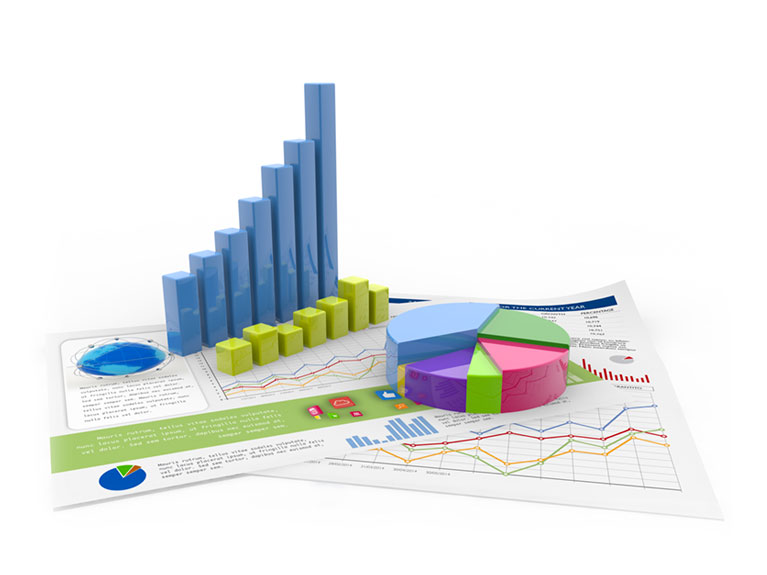
Being strategic partner of UAE, Pakistan offers great investment opportunities to the UAE’s investors in various sectors of its economy including infrastructure development, power generation, water management and agro industries. UAE-Pakistan should explore joint ventures (JVs) and investment in aluminum products, horticulture, farming, dairy farming, livestock, financial sector, pre-fabricated houses and affordable low income houses. Moreover, two countries should strengthen their SMEs to achieve more beneficial results.
United Arab Emirates (UAE) is a role model for the regional as well as emerging countries in the world in terms of socio-economic prosperity, happiness, qualitative life, sustainability, law and order and the last but not the least diversification of economy, energy and productive channels. The UAE GDP increased more than 236-fold from Dh6.5 billion in 1971 to Dh 1,540 billion in 2014 which has been further strengthened and progressed due to government’s business and investment policies.
It has pioneer in regional space pursuits. It is hub of foreign direct investments. It is an ideal center of multiculturalism. It has already been ranked one the safest and happiest countries in the world. It has diversified economy which is smart too. It has unique national policy of diversification of energy resources in the region as well as in the world. Its service sector is flouring and adding its position in the overall GDP. Despite low oil prices in the region and world its macro-economy is stable and sustainable.
UAE has already started its journey of space, outer space and beyond Mars which is now in upswing. Its journey from sand to space agency is a miracle. Its leaders have strategic vision and its people are dynamic enough to achieve all the unrealized dreams.
UAE’s business and investment friendly policies have successfully transformed its national economy into of a knowledge-based economy. Now it is the ideal hub of all kinds of business and investment activities and operations. It is one of the ideal destinations for the businessmen and interested investors alike.
Its economy is the most liberal entity in the GCC and MENA. It is 2nd largest economy in the region in terms of volume. It is ranked first in terms of quality, performance and production too. Vision 2021 has transformed its economy and made it more attractive, innovative, competitive and smarter.
Diversification of economy, energy and production has already made its macro-economy stable and sustained. Massive industrialization, rise to private sector, robust service sector, SMEs and rigorous commercial diplomacy has successfully mitigated the spillover effects of region and world’s weak economic conditions. Moreover, its resilient banking and financial sector provide the strategic cushion to finance many mega projects to create more and more jobs.
UAE is the one of the happiest country in the GCC, MENA and of course the world which shows that it has economics of happiness where people always prefer over corporate profits. Its unmatched socio-economic development is vertical as well as virtuous. Its diversification of economy and energy resources is horizontal as well as harmonious.
UAE’s government is people friendly. It has strategic orientation too. It has clear and comprehensive plans to achieve desired goals of socio-economic prosperity, de-carbonization development of renewables and zero discrimination system and society. Creation of ministries of happiness and tolerance is a giant step in right direction. It means a lot to its government, system, people and elements of peace and harmony in the society. It would mean sustainable development, environment friendly policies, strengthening of pure Emirati values and above all promotion of good governance.
Politically, UAE is one of the most liberal countries in the region. Gradual politicization is on the right path in shape of regular Federal National Council Elections. It stimulates best understanding of national politics and of course policies. It upholds culture of accountability and transparency. It empowers Emiratis which is deep-rooted democracy of the UAE, a unique model. Moreover, political stability has made it heaven for businessmen, investors, workers, laborers, and tourists alike.
On the front of human values, UAE has par excellence. There is no issue of human rights violations as somewhat propagated by the biased Western media. Its judiciary is fair and free. Its legislations are workers friendly due to which it is the ideal destination for residency, talent, recruitment and performance in the world.
Its tolerance level is unmatched. More than 200 different nationalities are working in the UAE which is the prime example of its official policies about interfaith harmony, peace and tolerance. Not a single decree and not a single incident is anti-racial ever happened/ reported in seven Emirates since inception. UAE stands for human development. It is the grand total of human values and humanity alike. There is no concept of gender discrimination throughout the country. All people, factions, groups, castes and colors have equal rights before the law and even “Emiratis” do not have any leverage what so ever. Law is supreme. No reporting of prejudice, discrimination and humiliation towards weaker sections of the society in the country. Expatriates are well protected and paid.
In UAE, the writ of the state and effective judicial system is upheld with high reverence. Governments across the world should learn due lessons from these high-standards of governance. Even the West acknowledges that the security and safety across UAE are par excellence. Expatriates truly feel privileged to work, live and raise a family in a safe and stable environment throughout the UAE. They are happy to note the economic, social and technological developments of the UAE. It has become the ideal choice to work and plan a career among the Arab youth.
UAE’s banking system is stable and resilient. Compared internationally, the Emirate banking industry is highly sophisticated offering state-of the art products and services in both consumer and corporate sectors. UAE banks are world’s most-capitalized and offer fully automated and secured banking platforms. Its prudent regulatory system has saved it from any kind of credit crisis in the country even in the ongoing global economic and financial crises. The robust Emirate banks have played a key role to support and enhance the UAE s economic growth consistently since its inception 1971.
UAE is the leading player in the green technologies. Its strategic vision of renewable energy production has achieved great success throughout the world. Renewable energy gears the pace of development. It guarantees the survival of humanity on this planet. It protects the dreams of socio-economic prosperity, stability and sustainability. It provides essential inputs of industrial productivity, generation of employment, reduction of poverty and above all promotes qualitative life and renewable/alternative energy is a value-addition.
Masdar, Its renewables icon, Masdar leads the GCC, MENA and the world. Masdar City (solar energy project) is a key element of the “Abu Dhabi 2030 Plan” and the government of Abu Dhabi’s strategic policy framework. Shams-1 is the first full scale renewable energy plant in the Abu Dhabi and largest CSP plant in the world. It will generate 100 MW covering an area of 2.5km, with plans to increase capacity to 2000 MW in the future. Hydrogen Power Abu Dhabi (HPAD) is a 60:40 joint venture between Masdar and BP to construct the world’s first commercial scale hydrogen fueled power plant, utilizing fossil fuel feed stock and CCS.
UAE-Pakistan bilateral relations are strong, stable and sustained. Both countries value their strategic partnership for achieving greater regional connectivity, socio-economic integration, and high inflows of FDls, initiation of various joint ventures and above all further strengthening of military cooperation. Both countries have economic game changers i.e. CPEC and EXP0- 2020 owing to which both countries must study befitting propositions in the days to come. Private companies of both the countries should focus on preferential areas for their further investments in the future. Food security needs to be tapped in win-win proposition between UAE and Pakistan. Further development of renewables has strategic orientation which must be jointly explored and tapped by both the countries in the days to come. Masdar input and cooperation would be decisive in the further development of energy cooperation between the two countries. UAE is the pioneer of Medical diplomacy which has even benefitted people of Pakistan by eradicating polio from Pakistan. The World Health Organization (WHO) has paid tribute to the United Arab Emirates for its pivotal role to eliminate all cases of polio around the world and especially in Pakistan.
UAE is among the top 20 competitive economies in the world and Pakistan’s economy is also stabilizing which must have common points, policies, projects, programs for its convergence in various sectors of economy, education, infrastructure, energy, agro-economy. Civil aviation, banking, insurance and the last but not the least, construction. I-JAE is the first country in the region to ratify WTO trade deal. Meanwhile, the UAE remains one of the world’s top trading economies, ranking 20th globally and first in the Middle East and Africa in commodity exports. It also placed 19th internationally in commodity imports and led the Mena region in overall commodity trade, with regional exports totaling $265 billion to account for 1.6 per cent of the worldwide total in 2015. according to WTO figures. Pakistani businessmen and investors must avail plan to get maximum advantage from UAE ratification of the WTO in order to increase volumes of bilateral trade in the days to come.
Prospects are bright and opportunities are unlimited for the further strengthening of UAE-Pakistan bilateral relations. The essential input may be further strengthening of “trust-deficit”, “points of convergence” and better political understanding between the two countries.


